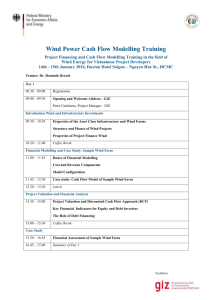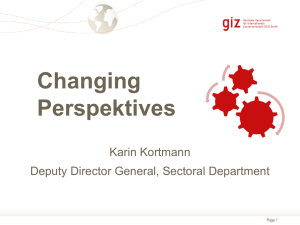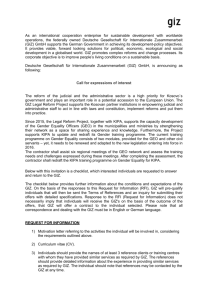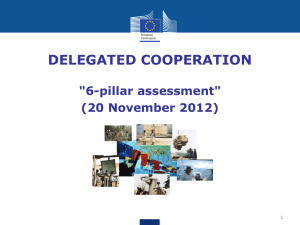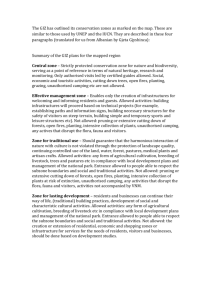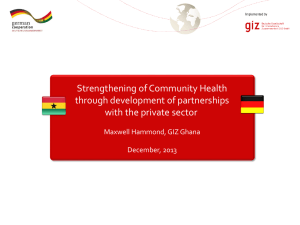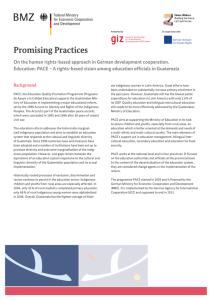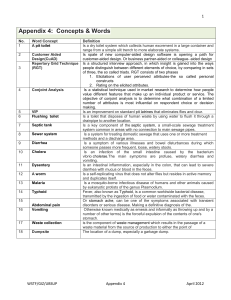Pro-Education Programme - Supporting High-Quality Primary
advertisement
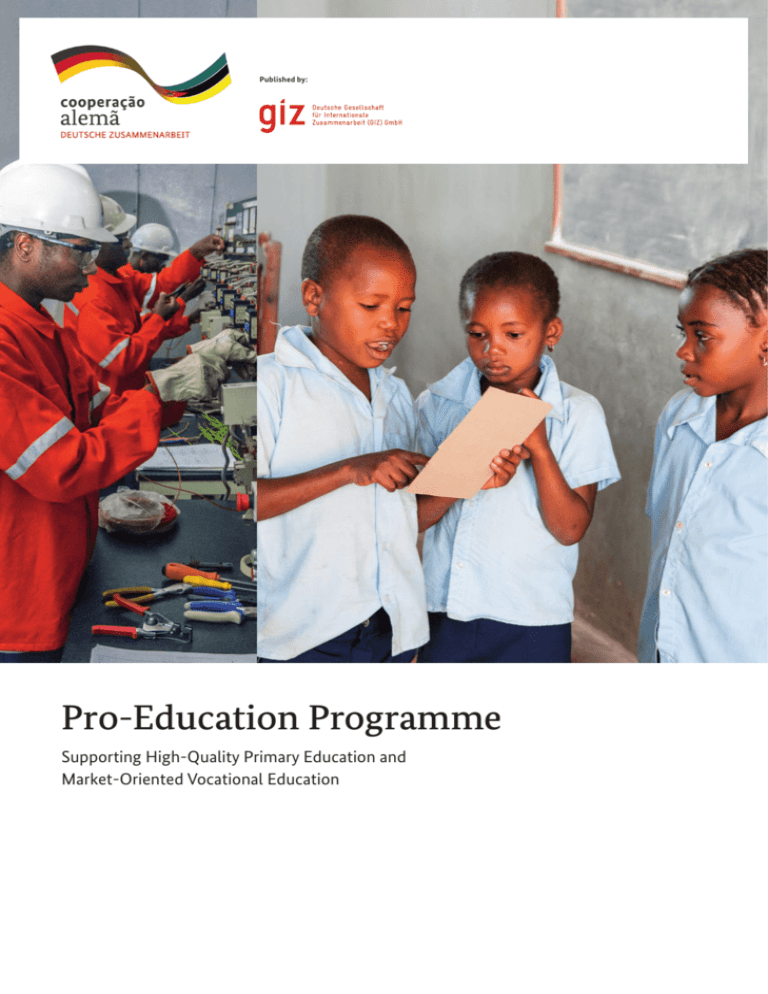
Published by: Pro-Education Programme Supporting High-Quality Primary Education and Market-Oriented Vocational Education Promotion of basic and technical education and vocational training in Mozambique (Pro-Education) Within the “Education for All” movement, large sums were invested in education during the last decade. This has led to a massive increase in the number of children attending primary education (5.4 million in 2012 against 1.4 million in 1992). Despite the efforts of the Ministry of Education (MINED), the Mozambican education system still has significant deficiencies. Poor quality and lack of relevance of lesson content jeopardise the success of basic and technical education and vocational training in Mozambique. The Basic and Technical Education and Vocational Training Programme (Pro-Education), is implemented by GIZ on behalf of the German Federal Ministry for Economic Cooperation and Development (BMZ). The programme is fully integrated into the Mozambican Government’s education strategy and vocational training reforms. In the fifth stage of its implementation, the programme supports the attainment of the objectives of the Strategic Education Plan for 2012 – 2016 in order to ensure that “children and young people, especially girls and young women, receive high-quality basic education relevant to the real world and employment-oriented vocational training”. Tanzania The activities of the GIZ Pro-Education Programme are centred on the focal p ­ rovinces of German cooperation: Inhambane, Sofala and Manica, as well as the capital ­Maputo. Zambia Malawi Zimbabwe SOFALA MANICA India n Ocea n INHAMBANE The programme provides the following services: Donor coordination and advice to the Ministry of Education Improving decentralised education administration and school management Advice on improving training of primary school teachers Pilot implementation of the vocational education and training reform in South Africa Maputo Swaziland the field of industrial maintenance Advice on improving training and continuing professional development of ­vocational teachers, Strengthening the implementation of HIV workplace programmes in the e­ ducation sector. Results and experiences 1. More effective school planning and management i.The annual school development plans are created at all levels of administration, and their implementation is monitored and corrected if necessary; ii. Many schools in the three provinces are running development programmes; iii. In over two-thirds of schools, activity plans are developed and run jointly with the school committees. 2. Improved quality and relevance of the content in classes i. More trained teachers are available as a result of the reform in teacher training; ii. Lesson content is more relevant and teachers can integrate HIV/AIDS-related content into their lessons. 3. Increased access rate i. Almost all children attend primary school in Sofala, Inhambane and Manica. 4.In technical education, the strategy of the new reform has enabled the design of a skills-based curriculum to address labour market requirements. 5.Cross-cutting issues such as gender and HIV/AIDS are given higher priority in annual planning at national level but also in the provinces, and particularly at the teacher training institutes. The selected projects Vocational Education Basic Education Coordination at National Level HIV Workplace POEMA Published by: Implementation of the vocational education reform – pilot centres Background Main activities The Mozambican economy has been recording remarkable growth, especially in the resources and related sectors. However, the vocational education system continues to be ill-prepared to train highly qualified professionals to meet this demand. The teachers are not sufficiently qualified to implement the new ­curricula or to ensure the maintenance of new equipment. 1. Developing the capacities of the DINET and INEFP as executing organisations to manage the implementation of the vocational education reform: Advice and technical support in the planning, monitoring and adaptation of implementation; Capacity building measures for professional and management staff of the DINET and INEFP. 2. Developing the capacities of the pilot centres to implement the reform strategy: Advice and technical support for the professional and management staff of the pilot centres in school management and development, implementation of the new curricula, installation, use and maintenance of new equipment, as well as in the cooperation with the private sector; Capacity building measures for the professional and ­management staff in the workplace and in Germany. 3. Production of teaching materials and manuals, purchase / co-funding of complementary equipment. The German Government supports the Integrated Vocational Education Reform Programme (PIREP) in the area of industrial maintenance (electricity, metalwork, mechanics, information and communication technologies (ICT), renewable energies) at the industrial institutes under the aegis of the DINET (National Directorate of Technical Professional and Vocational Education), and the Vocational Training Centres of the INEFP (National Institute of Employment and Vocational Training) in Maputo, Nampula and Sofala provinces. Objective To introduce to the pilot centres skills-based training in the technical fields of metal work and electrical engineering and contribute to the creation of a qualified labour force. Approach Technical and management staff (principals, pedagogical directorate, teachers, etc.) of the programme’s pilot centres are involved in the implementation of the reform. Practical lessons. Photo: © GIZ Photo: © GIZ Training in pilot centres. GIZ supports, in particular, teachers of the pilot centres with the aim of strengthening their teaching, methodological, technical and action-oriented skills, in order to enable them to deliver practice-oriented education. Results and experiences 2. New guidelines and strategic documents have been designed which, for the first time, provide for the involvement of the private sector and civil society in the planning and implementation of vocational education. 3. The reforms already initiated enable the educational offers to become more relevant to the real world, and there is already higher demand for this improved offer. 4. With the new curricula which have been developed jointly with the companies, future graduates are likely to find employment more quickly. 5. Model laboratories were installed at the Maputo Industrial Institute for the areas of electronics, metalworking, ICT and renewable energies. 6. A new training centre for TVET (technical and vocational education and training) was built at the Inhambane CFP (Vocational Training Centre) as part of a strategic alliance with Rio Tinto in order to provide better technical training services for young people. 1. Teachers trained (in the field of industrial maintenance) in the pilot schools apply the skills-based curricula. Contact: proeducation-moz@giz.de Our advisory concept focuses on initial and continuing teacher training. The programme will cooperate not only with the DINET and INEFP, but also with Instituto Superior Dom Bosco, Universidade Pedagógica, Universidade Eduardo Mondlane in Maputo and other qualified institutes. GIZ has mobilised new resources for vocational training through partnerships with the private sector in the design and development of standards and curricula, and we align our work with the needs of companies. Published by Deutsche Gesellschaft für Internationale Zusammenarbeit (GIZ) GmbH On behalf ofFederal Ministry for Economic Cooperation and Development (BMZ) Registered offices Bonn and Eschborn, Germany Divisions Southern Africa division / Education and the digital world Addresses of the BMZ offices BMZ Bonn BMZ Berlin Dahlmannstraße 4 Stresemannstraße 94 53113 Bonn 10963 Berlin GermanyGermany T +49 228 99 535 - 0 T +49 30 18 535 - 0 F +49 228 99 535 - 3500 F +49 30 18 535 - 2501 GIZ Pro-Education Rua Joseph Ki-Zerbo 99 Maputo, Mozambique T +258 21 498767 F +258 21 488768 proeducation-moz@giz.de www.giz.de/mozambique Responsible Cornelia Batchi Editorial assistance Nelly Guambe Layout Eva Hofmann, Katrin Straßburger, www.w4gestaltung.de As at June 2014 GIZ is responsible for the content of this publication. poststelle@bmz.bund.de www.bmz.de Published by: Sustainable improvement to the training of trainers in vocational education Background Main activities As in basic education, vocational teachers and other staff also lack adequate qualifications to implement the new curricula, for instance, or to ensure the maintenance of new equipment. Direct and permanent advice to the DINET on the implemen- At institutional level, the system responds too slowly to the growing need for technical staff because the institutions responsible for vocational education governance pursue divergent interests. Lack of coordination between the education structures at national and provincial level further exacerbates these difficulties. Objectives Improve the training and qualifications of vocational teachers; Build internal capacity at the National Directorate of Technical Education (Direcção Nacional de Ensino Técnico – DINET) for the coordination of the training of trainers (ToT) process. tation of the Strategic Education Plan with regard to the ToT process. Support the DINET’s organisational development process to ensure continuity of the process of vocational education reform and, in particular, to implement the ToT strategic plan. Promote short, medium and long-term agreements and commitments between the public and private sectors involved in the ToT process. Create the conditions for the establishment of an effective ToT coordination system. Build synergies between the DINET, the INEFP (National Institute for Employment and Vocational Training), and the PIREP (Integrated Programme for the Reform of Vocational Education) to ensure the implementation of the national ToT strategy for vocational education. Expand the ToT providers network for vocational education, as well as improve the quality of the training programmes. Group work during training. Photo: © GIZ Photo: © GIZ Training of trainers. Approach Ensure the success of the vocational education reform through high-quality ToT. To this end, the programme aims to establish realistic and feasible commitments between all stakeholders involved in ToT. Capacity building to implement the national strategic plans. Both the DINET (from the Ministry of Education) and the INEFP (from the Ministry of Labour) and the structures in charge of vocational education governance must be involved in organisational development processes that will ensure an effective performance of their duties. Private sector involvement in ToT. Permanent support from the private sector will be necessary in the design of ToT programmes, in particular in the technical training of the trainers. Coordination between the various stakeholders. Vocational education requires well-structured and coordinated ToT in order to ensure that only the highly qualified trainers required by the new vocational education system can enter it. Contact: proeducation-moz@giz.de Published by Deutsche Gesellschaft für Internationale Zusammenarbeit (GIZ) GmbH On behalf ofFederal Ministry for Economic Cooperation and Development (BMZ) Registered offices Bonn and Eschborn, Germany Divisions Southern Africa division / Education and the digital world Addresses of the BMZ offices BMZ Bonn BMZ Berlin Dahlmannstraße 4 Stresemannstraße 94 53113 Bonn 10963 Berlin GermanyGermany T +49 228 99 535 - 0 T +49 30 18 535 - 0 F +49 228 99 535 - 3500 F +49 30 18 535 - 2501 GIZ Pro-Education Rua Joseph Ki-Zerbo 99 Maputo, Mozambique T +258 21 498767 F +258 21 488768 proeducation-moz@giz.de www.giz.de/mozambique Responsible Cornelia Batchi Editorial assistance Nelly Guambe Layout Eva Hofmann, Katrin Straßburger, www.w4gestaltung.de As at June 2014 GIZ is responsible for the content of this publication. poststelle@bmz.bund.de www.bmz.de Published by: Strategic Alliance with Rio Tinto An alliance for socially responsible mining Background Objective The GIZ Pro-Education Programme has been providing technical support to the process of reforming the technical and vocational education and training (TVET) system in order to enhance its capacity to better meet labour market requirements. Support is provided in the area of industrial maintenance, school management and teacher training in the areas of electricity and metalwork. The objective is to improve the linkage between skilled labour requirements and the supply of skills development in Inhambane province. In June 2013, the GIZ Pro-Education Programme started a threeyear strategic partnership with the mining company Rio Tinto. The aim is to strengthen the economic and social development of the Jangamo district. Jangamo, adjacent to Inhambane city, is a future site for extraction of heavy sands (titanium) for Rio Tinto. The education programme supports the National Institute of Employment and Vocational Training (INEFP) in Inhambane in developing training based on real-world requirements. Expected outcomes: 1. Strengthening of the capacities of the Inhambane INEFP in market information collection; cooperation and coordination with the private sector; analysis of labour market requirements and worker skills upgrade. 2. Strengthening of the training capacities and conditions of the Vocational Training Centre (CFP). A student during a practical training. Photo: © GIZ Photo: © GIZ Inauguration of the electricity workshop. Main activities Results and experiences The objective of this alliance is to be achieved by: Establishment of an electricity workshop for the practice of Supporting data collection and usage and identifying future trends in the labour market at the Inhambane INEFP, Identifying technical training needs, Supporting the implementation of training courses and assisting in the training of trainers. Approach The target group is composed of young adults aged 25 – 35 looking for work, with priority given to the young adults of Jangamo. The programme focuses on the professions in the areas of electricity, electronics and renewable energies. A workshop will be funded and provided with appropriate furnishings and equipment, and the courses will be adapted to existing needs. domestic electrical installations, adjustment techniques, basic electronics and renewable energies, Short-term training programme and materials for electricity, electronics and renewable energies, Improved training provision at the Inhambane CFP in order to achieve better and more comprehensive employability of trainees as well as improved opportunities for entrepreneurship and self-employment, Improved pedagogical and technical capacities and skills of trainers, Improved linkage between skilled labour requirements and the supply of skills development in Inhambane province. Contact: proeducation-moz@giz.de Within the alliance, the GIZ Pro-Education Programme focuses on capacity development at the INEFP and its CFP. To this end, short and long-term advisory services will be provided and on-site capacity building courses conducted for technical and management staff in cooperation with Rio Tinto’s Training Centre in Tete. Published by Deutsche Gesellschaft für Internationale Zusammenarbeit (GIZ) GmbH On behalf ofFederal Ministry for Economic Cooperation and Development (BMZ) Registered offices Bonn and Eschborn, Germany Divisions Southern Africa division / Education and the digital world Addresses of the BMZ offices BMZ Bonn BMZ Berlin Dahlmannstraße 4 Stresemannstraße 94 53113 Bonn 10963 Berlin GermanyGermany T +49 228 99 535 - 0 T +49 30 18 535 - 0 F +49 228 99 535 - 3500 F +49 30 18 535 - 2501 GIZ Pro-Education Rua Joseph Ki-Zerbo 99 Maputo, Mozambique T +258 21 498767 F +258 21 488768 proeducation-moz@giz.de www.giz.de/mozambique Responsible Cornelia Batchi Editorial assistance Nelly Guambe Layout Eva Hofmann, Katrin Straßburger, www.w4gestaltung.de As at June 2014 GIZ is responsible for the content of this publication. poststelle@bmz.bund.de www.bmz.de Published by: Operating system laboratory offered and installed by STRATO at the Maputo Industrial Institute Background Main activities Information and Communication Technologies (ICT) and information applications are becoming increasingly important in Mozambique. In order to respond to the needs, a group of practitioners of the German company STRATO installed the ICT Laboratory at the Maputo Industrial Institute (IIM) in collaboration with the GIZ Pro-Education Programme in 2011. This laboratory has been delivering training courses based on the LINUX operating system to a wide range of students. In ­addition to software courses, hardware courses have also been run concurrently, in which participants work on the practical aspect of identifying components in computers, discuss the function of each of the components, assemble them and perform maintenance and repairs. The main activities being developed in this laboratory are related to training in information and communication technologies, covering both software and hardware components. In addition to this training, students also have the chance to conduct online research related to any other study activity. Objective To establish practical and technical training courses in computer science and ICT for students of the IIM and to train the teachers. One of the priority tasks at this moment to inform members of the women’s group about this laboratory and its facilities in order to improve and increase their participation. Approach The laboratory is open three days per week so that users can operate its equipment. In order to improve the services provided during the first phase of training, a local company specialising in this type of courses was hired. This participation of a local company was repeated once more to consolidate the teaching and learning methods, and the courses were then prepared and presented by the teachers and by Workshop on ICT. Photo: © GIZ Photo: © GIZ Practical computer courses. a university student who is currently responsible for the maintenance of the laboratory. The installed system is equipped with various programs to assist students in researching, identifying and exploring study material, and its main server remains in permanent contact with Berlin, Germany, to supervise and control the training activities. The students’ commitment to this type of training has been very encouraging, and the possibility of opening courses to interested members of civil society is being considered for the near future. The joint STRATO and GIZ Pro-Education Programme has become a creative idea. The programme won the 2012 innovation award of the German Federal Ministry for Economic Cooperation and Development. Results and experiences Approximately 60 students received practical / theoretical training in this laboratory until the end of 2013. Contact: proeducation-moz@giz.de In the scope of the cooperation with STRATO, the team that installed the system conducts study and work visits during which experiences are shared and practical network maintenance work is carried out with Mozambican students. Talented IIM students have the opportunity to gain valuable work experience at STRATO. The student responsible for the maintenance of the laboratory and the teacher received training at STRATO’s headquarters in Berlin. Published by Deutsche Gesellschaft für Internationale Zusammenarbeit (GIZ) GmbH On behalf ofFederal Ministry for Economic Cooperation and Development (BMZ) Registered offices Bonn and Eschborn, Germany Divisions Southern Africa division / Education and the digital world Addresses of the BMZ offices BMZ Bonn BMZ Berlin Dahlmannstraße 4 Stresemannstraße 94 53113 Bonn 10963 Berlin GermanyGermany T +49 228 99 535 - 0 T +49 30 18 535 - 0 F +49 228 99 535 - 3500 F +49 30 18 535 - 2501 GIZ Pro-Education Rua Joseph Ki-Zerbo 99 Maputo, Mozambique T +258 21 498767 F +258 21 488768 proeducation-moz@giz.de www.giz.de/mozambique Responsible Cornelia Batchi Editorial assistance Nelly Guambe Layout Eva Hofmann, Katrin Straßburger, www.w4gestaltung.de As at June 2014 GIZ is responsible for the content of this publication. poststelle@bmz.bund.de www.bmz.de Published by: Technical and vocational education and training for renewable energies Background Main activities The Poverty Reduction Action Plan provides for the expansion of electricity supply as an important tool to promote economic development and reduce poverty, especially in rural areas. The promotion of renewable energies has high priority in this context, with solar energy becoming increasingly important. However, Mozambique does not have experts in this field. Advice on the development and implementation of new The GIZ Pro-Education Programme therefore supports the Ministries of Education and Labour in the field of renewable energies in the technical and vocational education and training sector. Objective The programme objective in this field is to gradually mainstream the topic in technical and vocational education and training in industrial maintenance through new modules, capacity building of trainers and sensitisation of key players in both the public and the private sector. modules on renewable energies for the electrician profession (renewable energies technician); Capacity building of electricity teachers in new technologies, planning of solar energy systems, organisation and delivery of courses and training to students; Creation of a training laboratory for renewable energies in Maputo: procurement, installation and use of new equipment; Establishment of partnerships between the education and training sectors; Active participation of key leaders from the sector of education and technical and vocational training at national and international conferences and workshops, facilitating the exchanges between other countries and national players; Study trips; Technical advice in three technical and vocational education institutions that introduce modules on renewable energies; Cooperation with NGOs, businesses, FUNAE (National Energy Fund), associations and others; Follow-up of the renewable energies alumni network. Practical experience. Photo: © GIZ Photo: © GIZ Practical lessons. Approach Results and experiences The approach of the Pro-Education Programme has two dimensions: Twenty-five teachers and professionals of various educational 1. Promoting awareness and sensitising the central political level to the topic with the aim of mainstreaming it in strategy discussions and formulation; 2. Providing a practical example in the field of electricity: developing modules, teacher training, installing a training laboratory, laboratory management, introducing the modules and training of students and others. This approach enables the practical experiences at political level to be discussed and to serve as learning examples that can be adapted and replicated in other professions. Cooperation with various stakeholders, especially the private sector, is crucial in this approach. To this end, the Pro-Education Programme works closely with the AMES (Access to Modern Energy Services) multinational programme, which is implemented by GIZ Mozambique. Sharing experiences with other countries in the region and Germany allows the Ministries of Education and Labour to learn about forms and sources of renewable energy and their potential, new technologies, cooperation with companies, curriculum development and approaches for training in renewable energies. institutions underwent a three-month training in Germany. After they returned to their country, an alumni network was established which to date has successfully trained 25 more teachers and trainers, 500 students, over 100 members of rural communities and over 100 professionals from different fields. The first laboratory for training in renewable energies was installed at the Maputo Industrial Institute. Managing the laboratory and cooperating with the private sector and other players is a challenge for the institute. Partnerships have been established between Instituto Industrial Maputo, Universidade Pedagógica, FUNAE and others. The renewable energies alumni network has held two national workshops on “Education for Renewable Energies and Sustainable Energy Use”. The Mozambican experience has been presented at various regional workshops and in Germany. Contact: proeducation-moz@giz.de Published by Deutsche Gesellschaft für Internationale Zusammenarbeit (GIZ) GmbH On behalf ofFederal Ministry for Economic Cooperation and Development (BMZ) Registered offices Bonn and Eschborn, Germany Divisions Southern Africa division / Education and the digital world Addresses of the BMZ offices BMZ Bonn BMZ Berlin Dahlmannstraße 4 Stresemannstraße 94 53113 Bonn 10963 Berlin GermanyGermany T +49 228 99 535 - 0 T +49 30 18 535 - 0 F +49 228 99 535 - 3500 F +49 30 18 535 - 2501 GIZ Pro-Education Rua Joseph Ki-Zerbo 99 Maputo, Mozambique T +258 21 498767 F +258 21 488768 proeducation-moz@giz.de www.giz.de/mozambique Responsible Cornelia Batchi Editorial assistance Nelly Guambe Layout Eva Hofmann, Katrin Straßburger, www.w4gestaltung.de As at June 2014 GIZ is responsible for the content of this publication. poststelle@bmz.bund.de www.bmz.de Published by: Building the capacities of decentralised educational institutions Background Main activities With a view to improving the relationship between citizens and the public sector in Mozambique, a reform process was started in 2001 which aimed to bring public services closer to the citizens and enable decision-making at grassroots level (decentralisation and devolution), among other changes. 1. Advising education administration institutions at provincial and district levels on: Preparing, implementing and monitoring education plans; Organisational development; improving administrative and technical skills; Improving planning management and financial management; Improving oversight. 2. Supporting the Ministry of Education in the improvement and introduction of the capacity building modules and POEMA (Planning, Budgeting, Execution, Monitoring and Evaluation) self-learning materials at national level. 3. Advising both provincial and district administrations on improving the training and continuing professional development measures for officials from the school boards in the area of school management. 4. Advising district administrations on improving the support to schools in planning and implementing school development programmes. 5. Developing instruments and materials to improve the administrative and management processes at provincial, district, ZIP (Pedagogical Influence Zone) and school levels. The reform provided for the establishment of district governments that would be responsible for various areas of state intervention, including the education sector. The GIZ Pro-Education Programme has been providing both technical and financial ­support to the various levels and areas of the education sector. Objectives One of the objectives of the GIZ Pro-Education Programme is to support the decentralised institutions of the education sector – the Provincial Directorate of Education and Culture (DPEC), the District Service for Education, Youth and Technology (SDEJT) and the Teacher Training Institutes (IFP) – in order to enable them and their subordinate institutions to better cope with the challenges of the reform. Students in a classroom. Photo: © GIZ Photo: © GIZ Capacity building. 6. Advising the decentralised educational institutions on mainstreaming HIV / AIDS prevention measures and promoting gender equality in the plans of activity 7. Various instruments have been jointly developed to support the implementation of the devolved competences: POEMA modules; Manual on quality in school; Manual providing guidance on the management of administrative routines relating to human resources and a corresponding calendar; Manual providing guidance on financial routines; Manual providing guidance on the processes and activities of the district service responsible for the education sector; Logbook to record recommendations from oversight activities, among others. Approach The main stakeholders are the officials from the institutions that manage the education sector at provincial and district levels and from the teacher training institutions. Through this group, the aim is to also improve the performance of the school managers in primary education, as the school is where the teaching and learning process takes place. Under the Pro-Education Programme, teams of advisors were assigned to three provinces in ­Mozambique (Sofala, Inhambane and Manica). These advisory services are designed to enable the counterpart to continue developing its institutional capacity on its own by the end of the Programme. The best practices developed are presented by the counterpart in national meetings or channelled to the Ministry of Education through the Programme offices in Maputo. Results and experiences In order to measure the results of the support provided, clear indicators have been defined that are periodically measured on the ground. According to observations, the district officials are already developing many of the acquired skills independently and with reasonable quality. The constant change of the officials from the counterpart working with the programme has been adversely affecting the consolidation of the capacities of the institutions. The decentralised education institutions (at provincial, district and school level) within the three focal provinces of the programme have improved their performance capacity and their planning and monitoring of activities. Contact: proeducation-moz@giz.de Published by Deutsche Gesellschaft für Internationale Zusammenarbeit (GIZ) GmbH On behalf ofFederal Ministry for Economic Cooperation and Development (BMZ) Registered offices Bonn and Eschborn, Germany Divisions Southern Africa division / Education and the digital world Addresses of the BMZ offices BMZ Bonn BMZ Berlin Dahlmannstraße 4 Stresemannstraße 94 53113 Bonn 10963 Berlin GermanyGermany T +49 228 99 535 - 0 T +49 30 18 535 - 0 F +49 228 99 535 - 3500 F +49 30 18 535 - 2501 GIZ Pro-Education Rua Joseph Ki-Zerbo 99 Maputo, Mozambique T +258 21 498767 F +258 21 488768 proeducation-moz@giz.de www.giz.de/mozambique Responsible Cornelia Batchi Editorial assistance Nelly Guambe Layout Eva Hofmann, Katrin Straßburger, www.w4gestaltung.de As at June 2014 GIZ is responsible for the content of this publication. poststelle@bmz.bund.de www.bmz.de Published by: Training primary school teachers Teacher quality – an imperative for quality in education Background Objectives The education sector is highly reliant on human resources. In 2009, 55 % of public sector employees were working in the education sector. Thousands of teachers were hired in response to the large increase in student numbers. Between 1998 and 2009, the number of teachers increased nearly 100 %. One of the programme objectives is to strengthen the capacities of the Teacher Training Institutes (IFP) to train qualified teachers who have in-depth knowledge of the use of participatory and learner-centred teaching methods. With a view to improving the quality of education and acknowledging that teachers are key to improving the quality of education, the government conducted a reform of teacher training in 2007. Thus, since 2007 the training of teachers has been administered by a single institution, the medium-level Teacher Training Institute (Instituto de Formação de Professores – IFP), which is accessible after year 10 completion and provides a fast-tracked one-year course. Main activities The reform provided for the creation of an integrated system for initial training and continuing professional development of teachers, a linkage between theory and practice and the introduction of a new paradigm in teacher training, preparing them with basic skills to teach students how to analyse, reflect, decide and justify. 1. Advice on participatory learner-centred teaching. 2. Encourage the production and use of didactic material in active classes on the basis of local material. 3. Brainstorming meetings and sessions for improving teaching skills. 4. Consolidation of a professional development strategy for both administrators and teachers, including the production of materials for professional development. 5. Development of follow-up instruments for professional development activities. 6. Strengthen teaching practices and the associated schools as a training laboratory. 7. Support the institutional development plan of the IFP. 8. Strengthen communication and coordination between the provincial and district level institutions. 9. Mainstream cross-cutting issues such as HIV / AIDS, gender and local curriculum into teacher training. Teacher training. Photo: © GIZ Photo: © GIZ Teacher lecturing. Approach Results and experiences The main stakeholders are the directorates and teacher training experts of the institutions that administer education at provincial and district level, the trainers from the Teacher Training Institutes and the teachers of the associated schools. Practical training of teachers has improved and their ability In 2012, the National Teacher Training Directorate (Direcção Nacional de Formação de Professores – DNFP) and the GIZ Pro-Education Programme managers signed a memorandum of understanding with the aim of contributing to improving teaching quality by training highly skilled teachers in the three provinces of Sofala, Inhambane and Manica, and thus improving the quality of education in Mozambique. The objective of this group is to improve the teaching and learning process at school level. Under the GIZ Pro-Education Programme, a team of advisors was put in place, and for each participating province a teacher training advisor was assigned to directly support the management of the Teacher Training Institutes. to use active and participatory methods has been enhanced. Production and use of adapted teaching material in teacher training has improved. Oversight of teaching practices and graduate trainee followup has improved. Systematisation of materials for the Continuing Professional Development Programme. Teaching workshops for the production of teaching material kits for the teaching of basic numeracy and literacy have been established. A catalogue of teaching material has been produced. A database of continuing professional development of teachers and principals has been developed. The institutional capacities for the management of teacher training have been strengthened. A linkage exists between initial training and continuing professional development to improve teaching quality. Sharing experiences between IFPs stimulates innovation and improves the efficiency of the IFPs. Coordination between the education institutions and the provincial and district levels, which is crucial for improving teacher training. Contact: proeducation-moz@giz.de Published by Deutsche Gesellschaft für Internationale Zusammenarbeit (GIZ) GmbH On behalf ofFederal Ministry for Economic Cooperation and Development (BMZ) Registered offices Bonn and Eschborn, Germany Divisions Southern Africa division / Education and the digital world Addresses of the BMZ offices BMZ Bonn BMZ Berlin Dahlmannstraße 4 Stresemannstraße 94 53113 Bonn 10963 Berlin GermanyGermany T +49 228 99 535 - 0 T +49 30 18 535 - 0 F +49 228 99 535 - 3500 F +49 30 18 535 - 2501 GIZ Pro-Education Rua Joseph Ki-Zerbo 99 Maputo, Mozambique T +258 21 498767 F +258 21 488768 proeducation-moz@giz.de www.giz.de/mozambique Responsible Cornelia Batchi Editorial assistance Nelly Guambe Layout Eva Hofmann, Katrin Straßburger, www.w4gestaltung.de As at June 2014 GIZ is responsible for the content of this publication. poststelle@bmz.bund.de www.bmz.de Published by: School Council Background In the last few decades, Mozambique has made major progress in expanding primary education. The school enrolment rate increased from 45% in 1998 to 95% in 2010. Notwithstanding all of these achievements, the country still does not offer satisfactory primary education. Half the students in primary education drop out of school without completing year 5. Improved access to primary education also has not resulted in better quality. In order to address these challenges, community involvement in school life has been encouraged. In 2003, the school council was institutionalised and the Direct Support to Schools (ADE) project was introduced, which provides schools with resources to be used for improvements. The substitution of the school board by the school council as the supreme body highlights the value of the different stakeholders involved in the educational process. Thus, the school council is composed of at least the school principal (the only member not subject to vote), 4 representatives of the teachers, 2 representatives of the school staff, 3 representatives of the parents and guardians, 2 representatives of the community and 3 representatives of the students. The school council is structured to include 4 committees: 1. 2. 3. 4. Committee on finances, construction, and school production; Committee on HIV / AIDS, sanitation, and school health; Committee on school culture and sports; Committee on gender, orphans and vulnerable children. School councils face some difficulties such as rotation every two years, the low literacy level of their members, opposition from principals who cling to power and a poor support structure. Objectives The GIZ Pro-Education Programme strengthens the provincial and district level structures supporting the functioning of the school councils in their efforts to improve the students’ teaching and learning process and to achieve relevant, good-quality education. Main activities 1. Strengthening the capacities of school councils for greater involvement in school life. 2. Advice to the district institutions supporting the school councils on participatory school management and development. Selection process of the members of the council. Photo: © GIZ Photo: © GIZ Member of school council in action. 3. Supporting the systematisation of information from the supervision of primary schools. 4. Supporting the design of instruments to assist in participatory school management and development. 5. Advice on the introduction of a self-assessment culture in the national system of quality indicators and standards in school management. 6. Advice to the gender units on the development and monitoring of strategies aiming to reduce drop-out rates. 7. Promotion of competitions for a better educational environment and documentation of best practices. The GIZ Pro-Education Programme supports the school councils by strengthening provincial and district level institutions supporting the school councils. The main actors are the professionals at the district level institutions that directly support school boards and the gender unit at provincial level. A supporting team was put in place under the programme to: The capacities of provincial and district institutions which Approach Results and experiences Develop the capacity of provincial and district level institutions supporting school councils; Support the preparation of supporting instruments for participatory school management and development. ensure that the school councils operate with the active participation of both parents and school community have been strengthened. The parents and communities are more concerned with the quality of teaching and actively participate in school life Schools have a vision, long-term school development plans (SDP), and annual plans of activity (PoA) with corresponding budgets. More transparency in financial management. Improved educational infrastructure through community involvement in construction and refurbishment. An improved teaching and learning environment. Local curriculum manuals with local content for all districts in the three provinces. Teaching adapted to the students’ reality. The district teams oversee and follow up the activities of the school councils. Gender units are active and pursue local strategies to reduce drop-out rates. Contact: proeducation-moz@giz.de Published by Deutsche Gesellschaft für Internationale Zusammenarbeit (GIZ) GmbH On behalf ofFederal Ministry for Economic Cooperation and Development (BMZ) Registered offices Bonn and Eschborn, Germany Divisions Southern Africa division / Education and the digital world Addresses of the BMZ offices BMZ Bonn BMZ Berlin Dahlmannstraße 4 Stresemannstraße 94 53113 Bonn 10963 Berlin GermanyGermany T +49 228 99 535 - 0 T +49 30 18 535 - 0 F +49 228 99 535 - 3500 F +49 30 18 535 - 2501 GIZ Pro-Education Rua Joseph Ki-Zerbo 99 Maputo, Mozambique T +258 21 498767 F +258 21 488768 proeducation-moz@giz.de www.giz.de/mozambique Responsible Cornelia Batchi Editorial assistance Nelly Guambe Layout Eva Hofmann, Katrin Straßburger, www.w4gestaltung.de As at June 2014 GIZ is responsible for the content of this publication. poststelle@bmz.bund.de www.bmz.de Published by: Strengthening national coordination structures to implement the Strategic Education Plan Background In spite of recent progress, education quality is still poor in Mozambique. Only 49 % of children complete primary education, and only 45 % of girls. In order to improve this situation, the Ministry of Education will implement the 2012 – 2016 Strategic Education Plan (PEE) together with its partners. The PEE is the guiding document for the planning and budgeting of all interventions in the sector. Mozambique receives technical and financial support from various partners. The financial support is channelled to the Education Sector Support Fund (FASE) in order to execute the PEE. Objective The objective of German cooperation in this field is to strengthen the national coordination structures to implement the 2012 – 2016 Strategic Education Plan. Active participation in the human resources, financial plan ning and management and training of trainers interest groups. Active participation in the joint oversight visits to the provinces. Advice on capacity development, in particular on POEMA (Planning, Budgeting, Execution, Monitoring and Evaluation) at the various institutional levels. Compilation of best practices and their inclusion in the advice and dialogue. Coordination with KfW Development Bank Advice to the representation of the German Ministry for ­Economic Cooperation and Development. Approach The approach of German cooperation is fully in line with the terms of reference for the dialogue between the Ministry of ­Education and its partners. The programme approach at central level covers two dimensions: Main activities Advice by the group of donors to the national directorates in 1. Active participation in donor coordination; 2. Capacity development at individual, organisational and ­institutional levels. charge of basic education and vocational education on the implementation of the PEE. Memorandum of Understanding, Strategic Education Plan, Terms of Reference. Results and experiences In its first dimension, the Pro-Education Programme supports the Primary Education Directorate (DINEP), the Technical and Vocational Education Directorate (DINET), the Teacher Training Directorate (DINFP), the Special Programmes Directorate (DIPE) and the Directorate of Financial Planning and Management (DIPLAC) in the following areas: The recommendations of the interest groups led by German Donor harmonisation; Definition of the priorities of the subprogrammes; Follow-up, monitoring and evaluation of the performance of the subprogrammes; Development, monitoring and update of activity plans. In its second dimension, the programme supports the Ministry of Education in enhancing the sector’s institutional capacity through: cooperation are integrated in the annual activity plans of the Ministry of Education. The experiences of the programme at provincial level are replicated to other provinces, including in the area of school management, teacher training and workshop maintenance. The advice provided under the programme and its experiences are highly sought after and valued by the ministry and other donors due to the synergies created by the programme activities . Other donors and partners use and multiply concepts and products of the Pro-Education Programme (e. g. POEMA). POEMA (Planning, Budgeting, Execution, Monitoring and Evaluation), an institutional development approach in the area of financial planning and management which operates at individual, organisational and systemic level to promote the adoption of an integrated public management vision. Promotion of an integrated public management vision; Effective institutional coordination; Harmonisation of processes; Promotion of institutional development in the education Contact: proeducation-moz@giz.de sector at all levels through the strengthening of POEMA capacities. Donor coordination Interest groups Troika MINED Ministry of Education Basic education Focal point: GIZ Secondary education Technical and professional education Focal point: GIZ Literacy & adult education Administrative & institutional development Working groups Planning & financial management Human resources development Other partners Italy World Bank Irish Aid DFID Thematic groups Germany UNICEF Canada USAID Construction of schools Focal point: KfW National Directorates CoordinationHarmonisation Teacher training Cross-cutting themes Published by Deutsche Gesellschaft für Internationale Zusammenarbeit (GIZ) GmbH On behalf ofFederal Ministry for Economic Cooperation and Development (BMZ) Registered offices Bonn and Eschborn, Germany Divisions Southern Africa division / Education and the digital world Addresses of the BMZ offices BMZ Bonn BMZ Berlin Dahlmannstraße 4 Stresemannstraße 94 53113 Bonn 10963 Berlin GermanyGermany T +49 228 99 535 - 0 T +49 30 18 535 - 0 F +49 228 99 535 - 3500 F +49 30 18 535 - 2501 GIZ Pro-Education Rua Joseph Ki-Zerbo 99 Maputo, Mozambique T +258 21 498767 F +258 21 488768 proeducation-moz@giz.de www.giz.de/mozambique Responsible Cornelia Batchi Editorial assistance Nelly Guambe Layout Eva Hofmann, Katrin Straßburger, www.w4gestaltung.de As at June 2014 GIZ is responsible for the content of this publication. poststelle@bmz.bund.de www.bmz.de Published by: HIV workplace “Pro-Education GIZ / HF / ICON” Preventing HIV and AIDS in the workplace in the education sector Background Objective An estimated 700 to 800 state agents and employees in the education sector died each year between 2008 and 2010. Official estimates in 2012 indicated that 2 % of state employees and agents in the education sector (about 2,000 people) were living with HIV / AIDS. Most of these teachers were receiving anti­ retroviral treatment. However, the data is unreliable and incomplete, and it is not consistent with the national HIV prevalence of about 11.5 %. The HIV workplace programme in the education sector is part of the GIZ Pro-Education Programme, whose aim is to: The activities for prevention of HIV in the workplace in the education sector are part of the national response and are conducted in cooperation with government and non-governmental partners. Support and consultancy for the Ministry of Education, par- Among them, the GIZ / Health Focus project implements the HIV workplace programme in the education sector under the GIZ contract. Bring about more effective implementation of the HIV workplace programme of the Ministry of Education. Main activities ticularly the Human Resources Directorate, the Directorate of Special Programmes (DIPE) and the National Directorate of Technical and Vocational Education (DINET); Advice to provincial and district education administrations, teacher training institutes as well as selected ZIPs and vocational education entities in the three focal provinces; Training of the HIV focal points in the provincial and district education administrations in the focal provinces; Initiatives and campaigns (HIV testing) and development of materials. HIV/AIDS awareness session. Photo: © GIZ Photo: © GIZ Workshop on HIV/AIDS. Approach For HIV prevention in the workplace, the GIZ Pro-Education Programme provides technical assistance to the MINED in order to conduct activities at national, provincial, and district level and includes support for the central bodies of the MINED. The programme targets 5,000 staff members of the education sector. In order to implement these activities, a network of prevention agents is to be strengthened where such a network already exists and created where it does not. The prevention agents are called “focal points” for prevention of HIV in the workplace. The Health Focus / GIZ HIV workplace programmecoordinates its activities with the National Directorate of Human Resources, which receives technical support, technical and leadership capacity building and support with information and communication material for the target group of teachers. At central level, the activities for the prevention of HIV in the workplace are directed and coordinated by the National HIV Workplace Committee, which should exist at provincial level within the DPEC (Provincial Directorate of Education and Culture). The Ministry of Public Service has a national strategy and an HIV workplace programme for the civil servants of 23 ministries in response to the HIV / AIDS situation in the country. In this context, 3,617 teachers of each of the three provinces (Sofala, Inhambane, and Manica) have participated out of a total of 35,000 teachers. Results and experiences Reduce loss or absenteeism of teachers and non-teaching staff due to death or illness. Most teachers and non-teaching staff covered by the project activities undergo testing for HIV and other chronic illnesses. The education sector has new and more motivating IEC ­materials on HIV prevention. Reduce HIV-related stigma among teachers and non-teaching staff. Contact: infomaputo@health-focus.de Telephone: +258 21 487645 Published by Deutsche Gesellschaft für Internationale Zusammenarbeit (GIZ) GmbH On behalf ofFederal Ministry for Economic Cooperation and Development (BMZ) Registered offices Bonn and Eschborn, Germany Divisions Southern Africa division / Education and the digital world Addresses of the BMZ offices BMZ Bonn BMZ Berlin Dahlmannstraße 4 Stresemannstraße 94 53113 Bonn 10963 Berlin GermanyGermany T +49 228 99 535 - 0 T +49 30 18 535 - 0 F +49 228 99 535 - 3500 F +49 30 18 535 - 2501 GIZ Pro-Education Rua Joseph Ki-Zerbo 99 Maputo, Mozambique T +258 21 498767 F +258 21 488768 proeducation-moz@giz.de www.giz.de/mozambique Responsible Cornelia Batchi Editorial assistance Nelly Guambe Layout Eva Hofmann, Katrin Straßburger, www.w4gestaltung.de As at June 2014 GIZ is responsible for the content of this publication. poststelle@bmz.bund.de www.bmz.de Published by: POEMA (Planning, Budgeting, Execution, Monitoring and Evaluation) Background Objectives In the period from 2001 to 2011, a public sector reform was undertaken which included the devolution and decentralisation of resources and responsibilities from the central level to the provincial, district and municipal levels. This process also affects the education sector and entails a process of change that is generating constant challenges for the officials and managers at district level, as they are faced with new and growing tasks and roles. To support Mozambique’s Ministry of Education (MINED) in strengthening the skills of non-teaching staff in financial planning and management at the various institutional levels. The Pro-Education Programme supports the Ministry of Education in facing up to these challenges by promoting institutional development in the education sector, particularly to the decentralised levels, empowering officials with practical tools and crucial knowledge on the management process. One of the main strategies is the POEMA (Planning, Budgeting, Execution, Monitoring and Evaluation), an institutional development instrument for financial planning and management which intervenes at the individual, organisational and systemic level to promote the adoption of an integrated vision of public management. Main activities i. Support the development of POEMA modules from design, development and enactment to the testing and technical review phase; ii. Support the development of self-instructional POEMA materials; iii. Advice on training POEMA trainers and in training designers of the modules; iv. Conduct POEMA capacity building activities in the GIZ focal provinces; v. Advice on the planning, monitoring and evaluation processes of the POEMA; vi. Advice on the POEMA development and consolidation strategy; vii.Promote inter-sector coordination and dialogue, as well as between the GIZ programmes within the scope of institutional development in the area of financial planning and management. Technical staff trained in POEMA modules. Photo: © GIZ Photo: © GIZ POEMA modules. Approach Results and experiences to date One of the key aspects of the POEMA approach is the local development of modules in which technical teams of the area of expertise of the module are called upon to develop quality materials based on concrete challenges on the ground. Five POEMA modules (Planning and Budgeting, Human The development of the modules and their use in the capacity building activities involves coordination between stakeholders at various institutional levels within the education sector, as well as a dialogue with the public finances and public service sectors. The POEMA thus becomes a capacity building process in which the making of a product creates a transformational process at the individual, organisational and institutional level. At the individual level, the POEMA modules help to enable both managers and officials to better plan, prepare budgets in a realistic and integrated manner and ensure effective implementation and efficient and careful management of resources. At the organisational and institutional level, the concept of an integrated management promoted by the POEMA helps to: i. Align management tools and harmonise implementation procedures; ii. Improve coordination, systematisation and documentation within public institutions; iii. Promote dialogue within and between sectors. Resources, Asset Management, Monitoring and Evaluation, and Documents and Archives) have been developed and two more are being developed (POEMA in Schools and Budget Management); A CD with self-instructional material has been developed whose content is available on the website of the Ministry of Education; 25 POEMA trainers have been trained; During the 2011 – 2013 period, nearly 576 education officials were trained in the focal provinces of German cooperation. In the last few years, the POEMA has also been adopted by other Mozambican ministries and public institutions outside the education sector, including the Ministry of Public Works and Housing, which was also supported by GIZ. The POEMA approach has become an effective instrument for organisational development at GIZ. The POEMA was selected by German cooperation as best practice with regard to the integration of tools, development of human capacity and advisory services. Contact: proeducation-moz@giz.de Published by Deutsche Gesellschaft für Internationale Zusammenarbeit (GIZ) GmbH On behalf ofFederal Ministry for Economic Cooperation and Development (BMZ) Registered offices Bonn and Eschborn, Germany Divisions Southern Africa division / Education and the digital world Addresses of the BMZ offices BMZ Bonn BMZ Berlin Dahlmannstraße 4 Stresemannstraße 94 53113 Bonn 10963 Berlin GermanyGermany T +49 228 99 535 - 0 T +49 30 18 535 - 0 F +49 228 99 535 - 3500 F +49 30 18 535 - 2501 GIZ Pro-Education Rua Joseph Ki-Zerbo 99 Maputo, Mozambique T +258 21 498767 F +258 21 488768 proeducation-moz@giz.de www.giz.de/mozambique Responsible Cornelia Batchi Editorial assistance Nelly Guambe Layout Eva Hofmann, Katrin Straßburger, www.w4gestaltung.de As at June 2014 GIZ is responsible for the content of this publication. poststelle@bmz.bund.de www.bmz.de Imprint Published by the Deutsche Gesellschaft für Internationale Zusammenarbeit (GIZ) GmbH Registered offices Bonn and Eschborn, Germany GIZ Pro-Education Rua Joseph Ki-Zerbo 99 Maputo, Mozambique T +258 21 498767 F +258 21 488768 proeducation-moz@giz.de www.giz.de/mosambik As at June 2014 Responsible Cornelia Batchi Editorial assistance Nelly Guambe Layout Eva Hofmann, Katrin Straßburger www.w4gestaltung.de Photo credits © GIZ / Joachim Stretz GIZ is responsible for the content of this publication. On behalf of the German Federal Ministry for Economic Cooperation and Development (BMZ)
